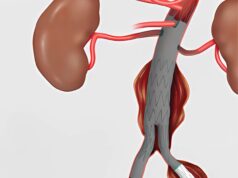Fabio Verzini, Hospital SM Misericordia, Perugia, Italy, presented results of a study which showed that EVAR positively impacts quality of life in the early phase, especially for mental health perception with patients experiencing a general feeling of physical and psychological well being after survival and recovery from the treatment.
At six months, there was a significant drop in three physical domains in patients who were under surveillance (physical functioning, role physical and bodily pain). On the other hand, there was significant improvement in four domains in early EVAR patients, one physical (general health) and three mental domains (social functioning, role emotional, and mental health).
The findings were presented in “Quality of life in patients with small abdominal aortic aneurysm: the effect of early endovascular repair vs. surveillance in the Caesar Trial” at the 2010 European Society for Vascular Surgery annual meeting in Amsterdam, The Netherlands.
The CAESAR trial is a prospective, randomised, multicentre trial comparing the effect of two different policies of surveillance and EVAR for patients with an aneurysm between 4.1 and 5.4cm in diameter. The trial was originally designed to have a two-year enrolment period with three years minimum follow-up. The trial showed no difference between surveillance and early intervention in terms of mortality. Follow-up is ongoing.
Late results showed a significant drop in physical functioning and vitality after surveillance and EVAR. There was no difference in general health, or emotional, and mental health. A significant drop in surveillance patients, but not in early EVAR patients, was evident in physical, bodily pain and social functioning. “Late quality of life decline was due to increasing age of patients, strict follow up protocol and the risk of primary and secondary interventions,” explained Verzini.












